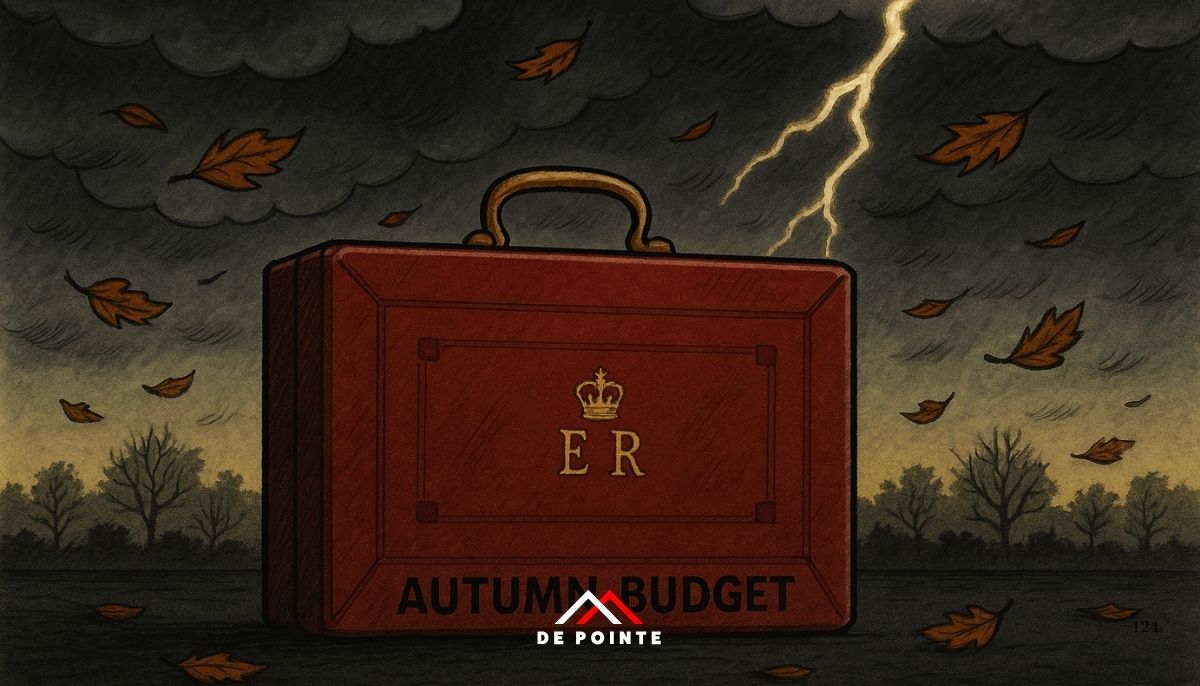Article

As the UK approaches the Autumn Budget 2025, scheduled for 26th November, markets are bracing themselves for one of the most critical fiscal events of the year. Against a backdrop of stubborn inflation, rising borrowing costs, and concerns about the sustainability of government finances, investors, businesses, and households are watching closely for signals of what’s to come.
At De Pointe Research, we specialise in analysing how events like the UK Autumn Budget affect both traditional and alternative investments. In this article, we’ll explore the latest market reactions, the most likely policies to emerge, and what this means for investors. For those wanting a deeper dive, you can sign up at the end of this piece for our free Autumn Budget 2025 Report, which will include detailed forecasts, sector-by-sector analysis, and actionable investment strategies.
Market Reactions Ahead of the UK Autumn Budget 2025
Financial markets have already begun to react in anticipation of the Budget.
- UK Borrowing and Gilt Yields
- Government borrowing for August surged to its highest level in five years, around £18 billion.
- Yields on 30-year gilts have risen to levels not seen in decades, signalling investor concerns about long-term fiscal sustainability.
- Higher yields mean higher debt servicing costs, leaving less fiscal room for the Chancellor to manoeuvre.
- Inflation and Business Confidence
- Inflation remains above the Bank of England’s target, and businesses are warning that further tax rises will increase costs.
- Private sector growth, as measured by PMI data, has slowed—particularly in export-led industries.
- Pressure on Fiscal Rules
- The Office for Budget Responsibility (OBR) is expected to downgrade productivity forecasts. This will worsen the fiscal outlook and increase the likelihood of tougher tax or spending measures.
- Analysts suggest that adhering rigidly to fiscal rules will be challenging without resorting to unpopular measures, such as threshold freezes or stealth taxes.
What Policies Are Likely in the Autumn Budget 2025?
Speculation is growing about what measures the government will unveil. Below are the areas most likely to see change:
Property and Housing Taxes
- Capital Gains Tax (CGT) Reform: Potential extension of CGT to high-value homes or removal of exemptions for primary residences above certain thresholds.
- Stamp Duty Reform: Rumours suggest SDLT could be replaced with a more proportional property tax for homes valued above £500,000.
- Landlord Taxation: Additional taxes on rental income, potentially via National Insurance adjustments.
Impact: These measures could slow housing market activity and put pressure on landlords, but they could also raise much-needed revenue.
Stealth Taxes: Threshold Freezes
- Freezing of income tax and inheritance tax thresholds means inflation will quietly push more taxpayers into higher bands, boosting Treasury revenue without changing headline rates.
Impact: Households face a real squeeze in disposable income, even without formal tax increases.
Business and Investment Taxes
- Possible new levies on high-profit sectors such as banking or energy.
- A long-awaited reform of business rates, with speculation that large online retailers and logistics firms may be targeted.
- Adjustments to ISA and pension allowances, potentially lowering tax-free savings thresholds.
Impact: Businesses may scale back investment due to higher costs, while savers could face reduced tax advantages.
Welfare and Public Spending
- Spending reprioritisation is expected, particularly with debt interest payments consuming a larger portion of the Budget.
- The state pension triple lock is likely to remain in place, with a rise of around 4.7% in 2026, potentially increasing fiscal pressure.
- Possible tightening of benefits eligibility to reduce costs.
Impact: Protecting pensioners will come at a cost elsewhere, potentially in welfare reforms or departmental cuts.
Smaller Measures (“Sin Taxes” and Loophole Closures)
- Environmental levies, luxury goods taxes, or gambling-related duties may be considered.
- The government may also consider tightening rules around inheritance and gifting, alongside new anti-avoidance measures.
What’s Less Likely in the Autumn Budget
Despite speculation, some moves are politically improbable:
- Raising VAT, income tax, or NI rates: Ministers have pledged not to increase these headline taxes.
- Deep cuts to protected budgets: Health, education, and defence will remain largely shielded, though efficiency measures may be introduced.
What This Means for Markets and Investors
The Autumn Budget 2025 has wide-ranging implications:
- Bond Markets: Rising gilt yields will continue to put pressure on government borrowing costs. Investors may seek refuge in shorter-dated bonds or alternative assets less exposed to fiscal uncertainty.
- Currency Markets: A lack of fiscal credibility could weaken sterling, affecting import-dependent businesses and overseas investment returns.
- Equities and Business Investment: Uncertainty over business rates and corporate levies may hinder expansion, particularly for UK-centric firms.
- Households: With threshold freezes, potential property tax hikes, and inflation still elevated, disposable income will remain under strain.
For investors, diversification into alternative assets such as art, gold, and whisky—markets De Pointe Research covers extensively—may provide stability during this period of policy uncertainty.
- Key Signals to Watch Before 26th November: The OBR’s updated growth and productivity forecasts.
- Movement in gilt yields and market pricing of UK sovereign debt.
- Treasury leaks around property tax or business rates reform.
- Statements from major business groups lobbying for relief.
Why This Autumn Budget Matters
The Autumn Budget 2025 is shaping up to be one of the most consequential in years. With markets already reacting to borrowing levels and investors nervous about fiscal credibility, every policy announcement will matter. For households, businesses, and investors, understanding both the short-term market reaction and the longer-term structural implications is essential.
Get Your Free Autumn Budget 2025 Report
At De Pointe Research, we are preparing a comprehensive Autumn Budget 2025 Report. Inside, you’ll find:
- Scenario analysis of optimistic, base case, and downside outcomes.
- Sector-by-sector breakdowns: property, business investment, savings, and alternative assets.
- Live market reaction tracking and implications for investment strategy.
Sign up below to get your free Autumn Budget Report and get the insights you need to prepare your portfolio, business, or household finances for the changes ahead.







